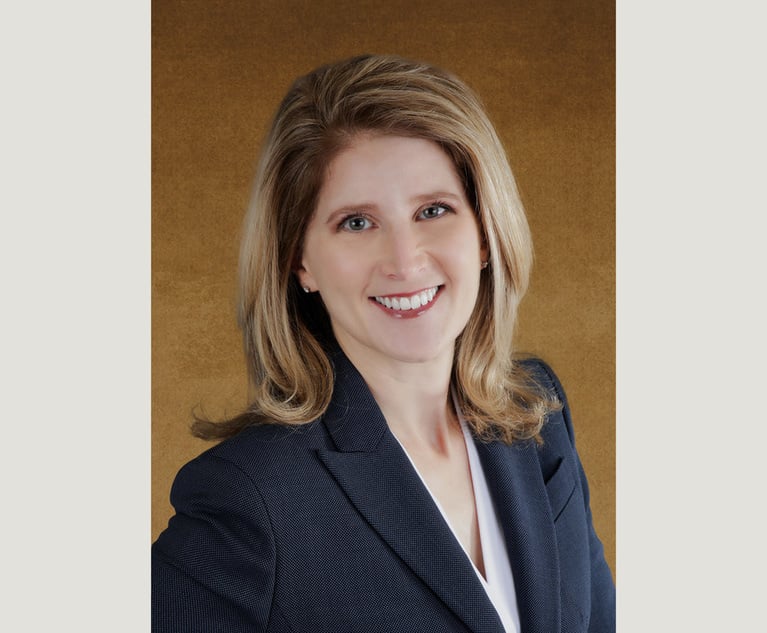 (L-R)Deborah Greenspan and Fredric M. Brooks of Blank Rome. Courtesy photos
(L-R)Deborah Greenspan and Fredric M. Brooks of Blank Rome. Courtesy photos A Look at Arbitration in the Age of #MeToo
As the #MeToo movement gained momentum so, too, have efforts by individuals claiming sexual harassment to bring legal action against their alleged abusers and their employers.
January 07, 2022 at 12:05 PM
9 minute read
As the #MeToo movement gained momentum so, too, have efforts by individuals claiming sexual harassment to bring legal action against their alleged abusers and their employers. But many of the efforts to seek redress through the courts for sexual harassment in the workplace have been derailed by broadly worded mandatory arbitration clauses in employment contracts. Many employers require their employees to sign agreements that require arbitration of at least some disputes arising out of the scope of employment, and those clauses have been invoked to preclude individuals from pursuing harassment claims in court. The scope, applicability, and legality of such clauses have embroiled employers of alleged abusers and plaintiffs in complex litigation over the initial question of the forum in which such claims may proceed. At the same time, the use of mandatory arbitration to address the difficult issues of sexual harassment has come under increased scrutiny. Indeed, in the wake of the #MeToo movement, many employers decided to eliminate mandatory arbitration provisions from their employment contracts. See "Google Ends Forced Arbitration for All Employee Disputes," N.Y. Times (Feb. 21, 2019) www.nytimes.com/2019/02/21/technology/google-forced-arbitration.html.
Concluding that mandatory arbitration of discrimination claims involving rights protected by federal statute and constitutional law is against public policy, several states enacted legislation prohibiting mandatory arbitration of sexual harassment or discrimination claims. In 2018, Maryland enacted legislation providing that "except as prohibited by federal law, a provision in an employment contract, policy, or agreement that waives any substantive or procedural right or remedy to a claim that accrues in the future of sexual harassment or retaliation for reporting or asserting a right or remedy based on sexual harassment is null and void as being against the public policy of the state." See Md. Lab. & Empl. Code Section 3-715(a) (2018). In 2018, the New York State Legislature enacted C.P.L.R. Section 7515, which declared that, except where inconsistent with federal law, mandatory arbitration provisions covering sexual harassment claims were null and void. New York amended that law in 2019 to expand its terms to cover all employment discrimination claims. In 2019, New Jersey enacted a law providing that any provision in an employment contract that "waives any substantive or procedural right or remedy relating to a claim of discrimination, retaliation, or harassment shall be deemed against public policy and unenforceable."
This content has been archived. It is available through our partners, LexisNexis® and Bloomberg Law.
To view this content, please continue to their sites.
Not a Lexis Subscriber?
Subscribe Now
Not a Bloomberg Law Subscriber?
Subscribe Now
NOT FOR REPRINT
© 2025 ALM Global, LLC, All Rights Reserved. Request academic re-use from www.copyright.com. All other uses, submit a request to [email protected]. For more information visit Asset & Logo Licensing.
You Might Like
View All
Pa. Supreme Court to Decide Enforceability of 'Browsewrap' Arbitration Agreements
8 minute read
From a Mediator’s Perspective: Common Mis-steps That Parties Make at Mediation
6 minute readLaw Firms Mentioned
Trending Stories
Who Got The Work
J. Brugh Lower of Gibbons has entered an appearance for industrial equipment supplier Devco Corporation in a pending trademark infringement lawsuit. The suit, accusing the defendant of selling knock-off Graco products, was filed Dec. 18 in New Jersey District Court by Rivkin Radler on behalf of Graco Inc. and Graco Minnesota. The case, assigned to U.S. District Judge Zahid N. Quraishi, is 3:24-cv-11294, Graco Inc. et al v. Devco Corporation.
Who Got The Work
Rebecca Maller-Stein and Kent A. Yalowitz of Arnold & Porter Kaye Scholer have entered their appearances for Hanaco Venture Capital and its executives, Lior Prosor and David Frankel, in a pending securities lawsuit. The action, filed on Dec. 24 in New York Southern District Court by Zell, Aron & Co. on behalf of Goldeneye Advisors, accuses the defendants of negligently and fraudulently managing the plaintiff's $1 million investment. The case, assigned to U.S. District Judge Vernon S. Broderick, is 1:24-cv-09918, Goldeneye Advisors, LLC v. Hanaco Venture Capital, Ltd. et al.
Who Got The Work
Attorneys from A&O Shearman has stepped in as defense counsel for Toronto-Dominion Bank and other defendants in a pending securities class action. The suit, filed Dec. 11 in New York Southern District Court by Bleichmar Fonti & Auld, accuses the defendants of concealing the bank's 'pervasive' deficiencies in regards to its compliance with the Bank Secrecy Act and the quality of its anti-money laundering controls. The case, assigned to U.S. District Judge Arun Subramanian, is 1:24-cv-09445, Gonzalez v. The Toronto-Dominion Bank et al.
Who Got The Work
Crown Castle International, a Pennsylvania company providing shared communications infrastructure, has turned to Luke D. Wolf of Gordon Rees Scully Mansukhani to fend off a pending breach-of-contract lawsuit. The court action, filed Nov. 25 in Michigan Eastern District Court by Hooper Hathaway PC on behalf of The Town Residences LLC, accuses Crown Castle of failing to transfer approximately $30,000 in utility payments from T-Mobile in breach of a roof-top lease and assignment agreement. The case, assigned to U.S. District Judge Susan K. Declercq, is 2:24-cv-13131, The Town Residences LLC v. T-Mobile US, Inc. et al.
Who Got The Work
Wilfred P. Coronato and Daniel M. Schwartz of McCarter & English have stepped in as defense counsel to Electrolux Home Products Inc. in a pending product liability lawsuit. The court action, filed Nov. 26 in New York Eastern District Court by Poulos Lopiccolo PC and Nagel Rice LLP on behalf of David Stern, alleges that the defendant's refrigerators’ drawers and shelving repeatedly break and fall apart within months after purchase. The case, assigned to U.S. District Judge Joan M. Azrack, is 2:24-cv-08204, Stern v. Electrolux Home Products, Inc.
Featured Firms
Law Offices of Gary Martin Hays & Associates, P.C.
(470) 294-1674
Law Offices of Mark E. Salomone
(857) 444-6468
Smith & Hassler
(713) 739-1250







